November 27, 2025 | 18:52 GMT +7
November 27, 2025 | 18:52 GMT +7
Hotline: 0913.378.918
November 27, 2025 | 18:52 GMT +7
Hotline: 0913.378.918
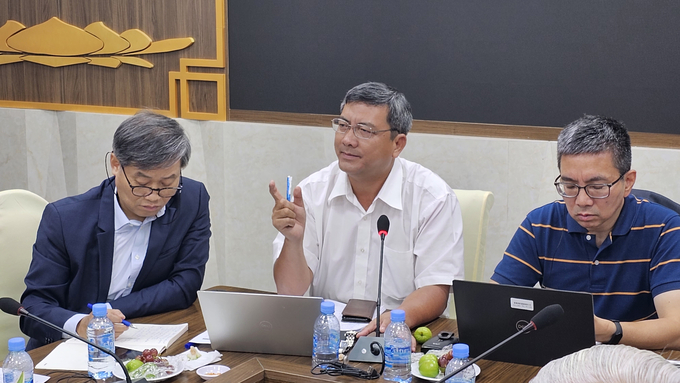
Dr. Tran Minh Hai, Vice Principal of the College of Management for Agriculture and Rural Development II emphasized: "The project sets out three main goals: green growth, ensure income for farmers and protect the environment". Photo: Hong Thuy.
The College of Management for Agriculture and Rural Development II under the Ministry of Agriculture and Rural Development held a consultation seminar on May 10. The seminar focsed on the "Investment mechanism, application of digital technology to support agriculture and the project to grow one million hectares of high quality rice".
According to Dr. Tran Minh Hai, Vice Principal of the College of Management for Agriculture and Rural Development II, the projcet's full title is "Sustainable development project to grow one million hectares of high quality rice in association with green growth in the Mekong Delta region"
The project aims to plant at least 500,000 hectares of high-quality rice in the Mekong Delta region by 2025. Consequently, the average income level for local farmers will reach over 35%. By 2030, the region will have one million hectares of high quality organic rice, and the average profit of rice farmers will be raised to 40%.
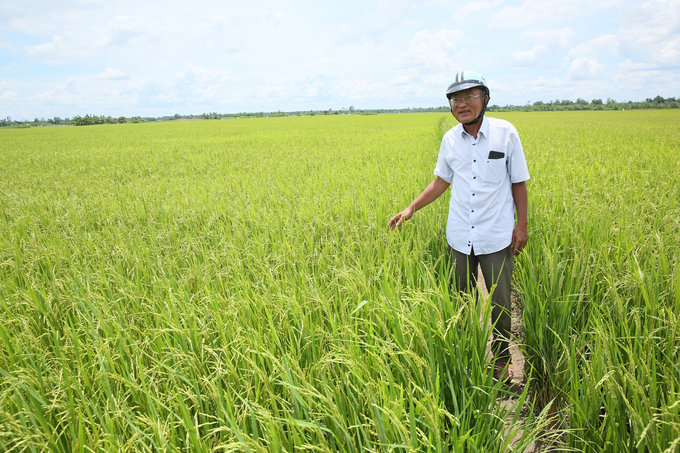
Organic rice cultivation at the Tang Hoa Agricultural Service Cooperative in Tang Hoa commune, Go Cong Dong district, Tien Giang province. Photo: Hong Thuy.
According to Dr. Hai, the development of green, organic and modern rice farming areas require several key goals to be met, including: synchronous mechanization of rice production; rapid application of high technology and digital technology to establish smart and accurate rice farming practices; develop a circular rice farming model that utilizes rice waste to enhance rice value as well as lessen adverse environmental effects.
"This project is not a particularly difficult task. We only need to rely available resources, systematize them and follow the process methodically. The project sets out three main goals: green growth, ensure income for farmers and protect the environment. On the other hand, by implementing this agricultural method, we can obtain a low-carbon certificate in addition to reducing greenhouse gas emissions”, Dr. Hai explained.
According to the project's schedule, a planned area specializing in stable high-quality rice production must be established by 2030, with continuous development towards 2050. The project also includes plans for a key farming area with a rotational crop system that alternates between rice, aquaculture, and upland crops. A complete and secure dike system with effective irrigation and drainage has been designed for the project site. Furthermore, the site is convenient for organizing production and trading; it features comprehensive transportation infrastructures to assist in the mechanization of various rice production stages including tillage, harvesting, preservation, storage and transportation.
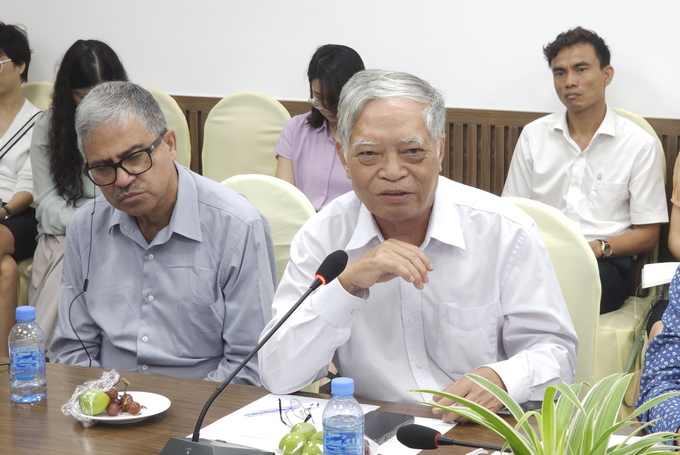
Former Deputy Minister of Agriculture and Rural Development Bui Ba Bong firmly believes in the feasibility of the project. He noted that it will significantly raise the standard of the Vietnam's rice industry. Photo: Hong Thuy.
At least one form of linkage must be established between rice farmers and output consumption businesses through cooperatives or other farmer organizations.
New technologies will be applied to further enhance the quality and efficiency of rice production, save on input materials and resources, reuse raw materials by-products, and reduce greenhouse gas emissions effectively.
The project also focuses on selecting rice varieties that are highly adaptable to the unique environmental conditions of the region, and suitable for for the simultaneous application of technological advancements. It will prioritize fragrant rice varieties, high quality rice varieties that favored by the domestic and internatonal markets.
"During the production process, the selected rice varieties must be closely monitored, evaluated with regards to yield, quality and effectiveness. We must also conduct additional consultation with domestic and foreign rice consuming businesses to ensure that the production meets market demand", said Mr. Hai
Mr. Pham Thai Binh, General Director of Trung An Hi-tech Agriculture Joint Stock Company in Can Tho city, have directed production and trading businesses as part of this project ten years ago.
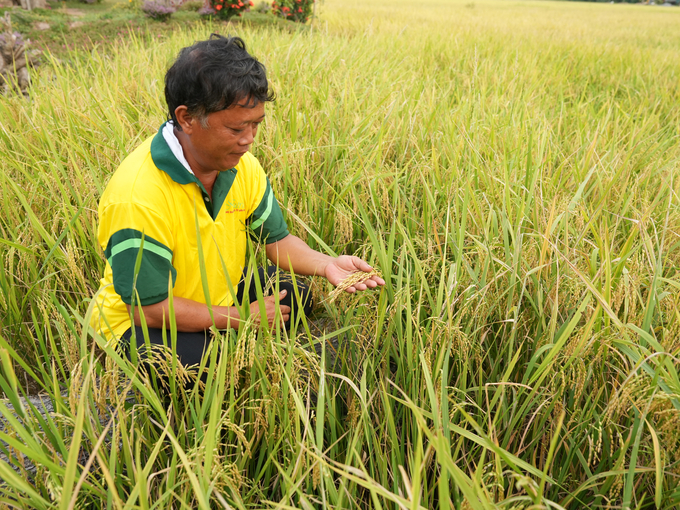
A linked organic rice field in Phu Tho Cooperative, Tam Nong, Dong Thap. Photo: Hong Thuy.
Mr. Binh stated that high quality specialized rice production must aim for a standard certification. Farmers should choose suitable standards such as "1 must 5 reduction", VietGAP, Global GAP, SRP, organic rice, etc. to proceed with the registration for product standard certification and growing area codes.
Businesses can utilize the "low-carbon rice" brand in addition to their own brand and the national rice brand if their product is approved by a competent authority for reducing greenhouse gas emissions.
“We have already implemented a one-million-hectare project last year, spanning across provinces in the Mekong Delta, starting from Long An and moving downwards. Many businesses have participated in this project. We hope that the Government will encourage the bank to participate in this project. With one million hectares of rice, a two-crop year will yield at least 14 million tons of rice and 1.7 million tons of high quality rice. Climate change and floodings will not affect these figures, so losses are very unlikely", sai Mr. Binh.
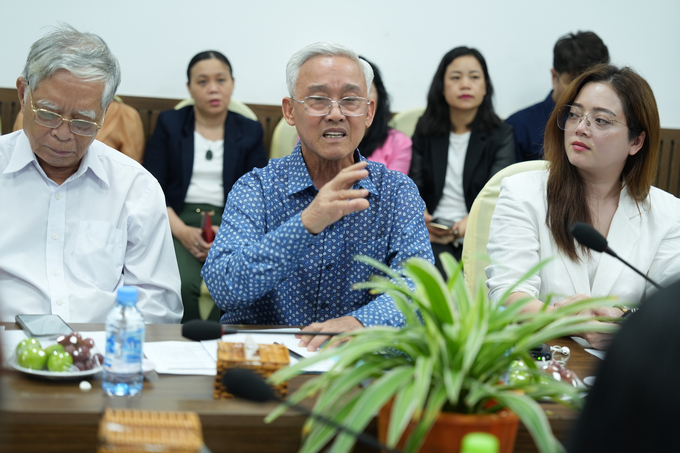
Mr. Pham Thai Binh, General Director of Trung An Hi-tech Agriculture Joint Stock Company commented: "With support from the bank in this project, we will only be making profits". Photo: Hong Thuy.
The project is expected to have an investment capital of 12 trillion VND, including 3,000 billion VND from the state budget, 8,400 billion VND from socialization capital, and the remaining from other sources. Farmers participating in the project will be supported with up to 30% of rice seed cost in the first four consecutive crops. Farmers are also eligible for unsecured loans of up to 20 million per crop with a loan period of six months.
According to a representative from the World Bank in Vietnam, WB supports approximately 40 million USD for the project to grow one million hectares of high quality rice to reduce emissions. Additionally, WB provided an aid of 60 million USD for the project to develop the carbon credit market after 2027. There is also a 20 million USD non-refundable program to support the project. The WB wishes to cooperate with the Ministry of Agriculture and Rural Development to implement additional projects in the Mekong Delta.
Translated by Nguyen Hai Long

(VAN) According to Mr. Vo Minh Thanh, Director of the Tay Ninh Department of Agriculture and Environment, Resolution 57 has created a new development pathway for the locality, shifting from traditional toward modern agriculture.
/2025/11/26/4909-2-154329_878.jpg)
(VAN) Pearl grouper farming in HDPE cages not only delivers economic efficiency but also contributes to protecting the environment, creating jobs, and promoting marine-based experiential tourism.

(VAN) The model of making a living under the forest canopy through the agroforestry system in Van Son commune, Bac Ninh province, is expected to generate an annual income of approximately VND 30 million/ha.

(VAN) Many enterprises in Can Tho are harnessing natural energy and reducing greenhouse gas emissions in their production processes, thereby contributing to the promotion of a sustainable green transition.
/2025/11/24/3536-2-112800_176.jpg)
(VAN) Dong Nai now has tens of thousands of hectares of forests certified for sustainable management, and this area will continue to be expanded in the coming period.

(VAN) Vinh Ha hamlet (Dai Xuyen commune, Hanoi) is shifting away from small-scale farming as households adopt bioscurity into their breeder chicken models.

(VAN) Heavy rains make aquatic species more vulnerable to disease. Proactive water management and high-tech systems help farmers prevent outbreaks and protect yields.